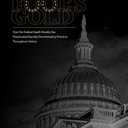
On March 21, 2024, the 1st U.S. Circuit Court of Appeals ordered the judge who presided over Dzhokhar Tsarnaev’s (pictured) trial to investigate his defense attorneys’ claims of juror bias and determine whether Mr. Tsarnaev’s death sentence should be overturned because of this bias. In a 2 – 1 decision, the 1st Circuit declined defense attorney requests to overturn Mr. Tsarnaev’s death sentence for his participation in the April 2013 Boston Marathon bombing but found that the trial judge “fell short of what was constitutionally required” in his investigation of potential jury bias, remanding the case for a new investigation. If Mr. Tsarnaev’s trial judge determines that either of the jurors in question should have been disqualified from serving on the jury, he could vacate Mr. Tsarnaev’s death sentence and require a new penalty-phase trial. In the appellate court’s ruling, the judges wrote that “even then, we once again emphasize that the only question in any such proceeding will be whether [Mr.] Tsarnaev will face execution; regardless of the outcome, he will spend the rest of his life in prison.”
In a 2020 ruling, the 1st Circuit set Mr. Tsarnaev’s sentence aside when it determined that the trial court erred in excluding evidence surrounding Mr. Tsarnaev’s brother’s influence over him during the commission of the crime and because “prospective jurors were not questioned enough about their exposure to news about the bombings.” Two years later, the United States Supreme Court restored Mr. Tsarnaev’s death sentence in a 6 – 3 ruling, where Justice Clarence Thomas wrote that the U.S. Constitution “guaranteed [Mr. Tsarnaev] a fair trial before an impartial jury. He received one.” After the Supreme Court’s reversal, Mr. Tsarnaev’s attorneys returned to federal appeals court in January 2023, urging the Court to consider additional issues that the Supreme Court did not hear, including the issue of seating jurors who may have lied during questioning, as well as three other claims pertaining to venue of the trial, the erroneous dismissal of a qualified juror, and the mistreatment of particular evidence.
During oral arguments in front of the appellate court, attorneys for Mr. Tsarnaev argued that one juror untruthfully told the judge she had not commented about the case online but found she had retweeted a post that referred to Mr. Tsarnaev as a “piece of garbage.” The other juror in question said his Facebook friends had not commented on the case, despite one friend urging him to “play the part” and get on the jury to send Mr. Tsarnaev to “jail where he will be taken care of,” according to defense attorneys. These concerns were initially raised at trial, but the trial judge did not investigate these claims further. William Glaser, a Justice Department lawyer, acknowledged the inaccuracies of the jurors’ statements, but said additional information suggests the jurors misremembered but did not lie. 1st Circuit Court Judge William Kayatta Jr., who delivered the 2 – 1 opinion, questioned Mr. Glaser on how the trial judge could have known this without investigating Mr. Tsarnaev’s claims.
The U.S. Justice Department (DOJ) has continued to aggressively defend Mr. Tsarnaev’s death sentence, despite Attorney General Merrick Garland’s 2021 announcement of a moratorium on federal executions during a review of the government’s death penalty policies and procedures. AG Garland’s moratorium came six months after former President Donald Trump left office. 13 individuals were executed during the final six months of President Trump’s administration. During the 2020 presidential campaign, President Joseph Biden promised to end the federal death penalty, however, his administration has taken no action towards abolition during his presidency.
AG Garland’s moratorium does not prevent the Department of Justice and its prosecutors from seeking new federal death sentences. On January 12, 2024, the DOJ announced that it will seek a death sentence for Payton Gendron, the then-18-year-old who killed ten Black people at a Tops supermarket in Buffalo, New York in 2022. Mr. Gendron’s case is the first capital case authorized by AG Garland and the Biden Administration’s DOJ but is not expected to proceed to trial until 2025. Mr. Gendron has already pled guilty to state charges and has offered to plead guilty to federal charges in exchange for a life sentence without the possibility of parole. The federal charges against Mr. Gendron include hate crimes, similar to many of the 63 charges brought against Robert Bowers after he shot and killed eleven worshippers at the Pittsburgh Tree of Life Synagogue in 2018. Mr. Bowers was also charged federally and received a death sentence on August 1, 2023. Mr. Bowers’ sentence was the first new federal death sentence since 2019 and the first secured by the Biden administration. Mr. Bowers and Sayfullo Saipov, for whom the DOJ also sought but failed to secure a death sentence, were initially charged under the Trump administration and Attorney General William Barr.
Alanna Durkin Richer, Appeals court orders judge to probe claims of juror bias in Boston Marathon bomber’s case, Associated Press, March 21, 2024; Nate Raymond, US appeals court directs probe of juror bias in Boston Marathon bomber’s case, Reuters, March 21, 2024; Alanna Durkin Richer, Court weighs tossing Boston marathon bomber’s death sentence, Associated Press, January 10, 2023.
See the 1st Circuit Court’s ruling, here.



